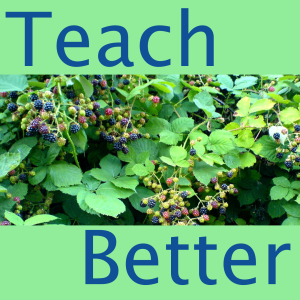
Podcast #47: Experiential Learning and Organizational Psychology with David Berg
 2017-02-06
2017-02-06
Our guest in this episode is organizational psychologist David Berg. He has taught in the Yale School of Management and is currently a Clinical Professor of Psychiatry in the Yale School of Medicine. David teaches students new ways to look at how organizations function through examples from their own lives. His classes look far more like organic conversations than traditional lectures, and students rave about how much they learn. We certainly learned a lot in our conversation.
You can subscribe to the Teach Better Podcast through your favorite podcast app or simply subscribe through iTunes if you don’t have one yet.
Show Notes0:00 ⏯ Intro
0:38 ⏯ Teaching doctors leadership in a clinical program–and teaching undergraduates too.
Moving students out of the individual frame-of-thinking.
One of David’s main goals was a critique of many approaches to leadership that reduce success and failure to the traits of an individual.
4:17 ⏯ When you buy a car, you suddenly notice other people who have that car.
80% of what happens in organizations has nothing to do with individuals.
Chrys Argyris on management.
Teaching students to think differently.
7:58 ⏯ Teaching hypothesis-testing using a special teaching method.
Figuring out not what’s true but what the weight of different factors might be.
The special method is: experiential learning as a way of learning concepts or conceptual tools.
Creating a setting in which people can talk about what they’re facing or curious about or troubling or confounding, and using that to practice this method of hypothesis-testing.
Edward calls this BYOP: Bring Your Own Problem.
Not all learners are like you.
13:10 ⏯ Meeting once a week with four to eight professionals for two semesters.
Doug asks: “Did you have a syllabus?”
“The structure of the educational event has to mirror the process you’re trying to engender.”
The students setting the learning objectives.
“Can’t you just teach us the material?”
A physics professor showing students that lecturing isn’t as effective as they think.
20:22 ⏯ Teaching about the problems with authority.
“Leadership [coordination and direction]…is the resultant vector…of a collaboration across hierarchy.”
Leadership as an individual attribution rather than a systemic feature.
Seeing systems is hard. (Oshry’s book)
Berg’s students learn to use a method to examine problems.
You may need two years of practice to get good at something.
26:08 ⏯ The filing cabinet image of the mind is hard to shed.
Transferring from what the students know in one domain to another.
Doug taught the same students for three semesters: teaching for one semester and practice for one or two.
Teaching without a textbook.
Would and should students recognize the names of the theories–vs. being able to use them?
“We’re trying to do different things, the textbook and me….This textbook will support your understanding of what happens in organizations.”
Discussion first, reading second. Recognizing chapter headings and ideas, the theory names not so much.
30:52 ⏯ Teaching “consumers” differently than you teach future professionals in your discipline: teaching the professional language.”
If the syllabus were on paper, students would then just wait for the instructor to explain the syllabus.
Responding to students based on your experience of how those students act–which might be something about the teacher, the students, the institution.
Thinking about the relationships created by hierarchy.
38:53 ⏯ Being the authority without being authoritative.
Running the class is not always being right.
Feelings as the starting point for analysis.
44:16 ⏯ Building trust with the students.
Results in social enterprises, including education, depend on the quality of the relationships amongst the people.
Boundary violations necessitate a figuring-out process that’s quite productive.
50:45 ⏯ The Teach Better Speed Round.
Teaching a class for no pay and with no credit for the students.
Learning for its own sake. Intrinsic motivation.
You can’t get a teaching award for a course that never existed.
54:24 ⏯ How to work with student groups.
The Student’s Guide to Successful Project Teams by William Kahn
A thoughtful exploration–with exercises.
Don’t throw spaghetti at the wall.
56:56 ⏯ A memorable teaching mistake.
Realizing you’ve been asymmetrical in your teaching.
“I felt violated in my own value system…How could I do this?”
“How do our institutional roles socialize us?”
Always being vigilant.
Edward: “The ultimate teaching technology is humanity.”
1:03:35 ⏯ Sign-off.
More Episodes
 2015-10-05
2015-10-05
Create your
podcast in
minutes
- Full-featured podcast site
- Unlimited storage and bandwidth
- Comprehensive podcast stats
- Distribute to Apple Podcasts, Spotify, and more
- Make money with your podcast
It is Free
- Privacy Policy
- Cookie Policy
- Terms of Use
- Consent Preferences
- Copyright © 2015-2024 Podbean.com




